Hey there, fellow curious minds! Today, we’re diving into the world of customizable work schedules and how they’re shaking up the work dynamics for better or for worse. If you’ve ever wished you could tweak your work hours to fit your life better, you’re not alone. Let’s unravel the impact of these flexible schedules in our lives, shall we?
Read Now : Precision-controlled Stunt Coordination Techniques
How Customizable Work Schedules Impact Our Lives
Picture this: waking up on a Monday morning without the dread of fitting your life around rigid work hours. The idea of customizable work schedules has become increasingly appealing in today’s fast-paced world. These adaptable timetables are a game changer for people looking to balance their professional and personal lives more effectively.
In a world where work-life balance is like finding a unicorn, customizable work schedules impact our lifestyles in more ways than one. They allow people to craft a timetable that aligns with their peak productivity times. Whether you’re a morning person or a night owl, having the flexibility to choose when you work can lead to more efficient and happier days. Let’s face it, a happier you is definitely a more productive you!
But it’s not all sunshine and rainbows. While the customizable work schedules impact individual productivity positively, they might pose challenges in collaboration. Imagine needing input from a teammate who’s taking their “me-time” during your crunch hour. So, it’s crucial for companies to balance these scheduling possibilities with good ol’ teamwork to ensure everyone is on the same page.
The Benefits of Customizable Work Schedules
1. Enhanced Productivity: Customizable work schedules impact your ability to work during your most productive hours, transforming you into a work ninja, slashing tasks effortlessly.
2. Work-Life Balance: Breaking free from the nine-to-five grind can significantly enhance your personal life, reducing stress and improving mental health.
3. Employee Satisfaction: Flexible work hours often lead to greater job satisfaction, creating a more loyal and motivated workforce.
4. Reduced Burnout: By allowing employees to control their schedules, companies see a drop in burnout rates and an increase in overall happiness.
5. Attracting Talent: Offering customizable work schedules can be a huge draw for top talent who value flexibility and autonomy in their careers.
The Challenges of Implementing Customizable Work Schedules
While the positives are enticing, let’s not forget the potential pitfalls. First off, managing a team that operates on vastly different schedules requires stellar coordination. When everyone is on their own time, syncing up for meetings or collaboration can be a bit like herding cats. Yet, many companies are finding innovative solutions to this challenge, from using digital tools to adopting asynchronous communication strategies.
Moreover, the customizable work schedules impact not only employee happiness but also the bottom line of businesses. It’s a puzzle of maintaining productivity without stretching resources too thin. Some leaders fear the lack of supervision could lead to drops in work output. Interestingly though, studies have shown flexible schedules often result in trust and empowerment, with employees willing to reciprocate with stellar performance.
Communicating in a Customizable Work Schedule Environment
Customizable work schedules do test the waters when it comes to communication. Here are a handful of tips to smoothen things out:
1. Utilize Digital Tools: Tools like Slack and Microsoft Teams help bridge the gap for teams working on different schedules.
2. Set Clear Expectations: Clearly define roles, responsibilities, and deadlines to ensure everyone knows what they’re accountable for.
3. Embrace Asynchronous Work: Encourage practices that allow work without the need for simultaneous online presence.
Read Now : Functional Core Conditioning Techniques
4. Foster a Collaborative Culture: Build a culture that values teamwork, despite differences in work timings.
5. Prioritize Meetings: Ensure that meetings are only held when absolutely necessary, to respect everyone’s schedules.
6. Offer Social Time: Allocate time for teams to connect informally, boosting morale and team spirit.
7. Regular Check-Ins: Schedule brief, regular check-ins to stay connected and address any emerging concerns.
8. Provide Resources: Give employees access to training and resources to improve remote communication skills.
9. Flexible Tools Adoption: Make sure your team has access to flexible project management tools that adapt to varying schedules.
10. Feedback Loops: Create a system for continuous feedback to adapt and refine flexible working practices.
Customizable Work Schedules: A Real Game Changer?
As we embrace the customizable work schedules impact, it’s clear that this shift is more revolution than trend. Many employees relish the chance to integrate their personal and professional commitments seamlessly. The workplace has evolved, and adaptability is key. Have you ever caught yourself wondering how life would be if your work schedule was less of a strict itinerary and more of a guideline?
Well, you’re not alone. With this newfound flexibility, people are more empowered to carve out time for the things that matter. Whether it’s attending a midday yoga class or picking kids up from school, customizable work schedules bring a sense of autonomy that traditional schedules couldn’t. However, it’s not without its challenges. The onus is on both employers and employees to create systems that allow flexible work without disrupting the team dynamic or individual productivity.
Navigating the Future with Flexible Work
Looking ahead, the impact of customizable work schedules will only amplify. As more companies adopt flexible models, employees are likely to see this as a baseline expectation rather than a perk. It’s an exciting time for workplace evolution, and the future seems bright for those willing to embrace change.
Ultimately, the narrative around work is shifting. It’s no longer about clocking hours but more about output and balance. The customizable work schedules impact will undoubtedly redefine productivity and satisfaction in ways we are only just beginning to explore. Here’s to a future where work fits around life, and not the other way around!
Feel free to drop your thoughts in the comments. How do you think customizable work schedules will shape our future work culture? 🍃
